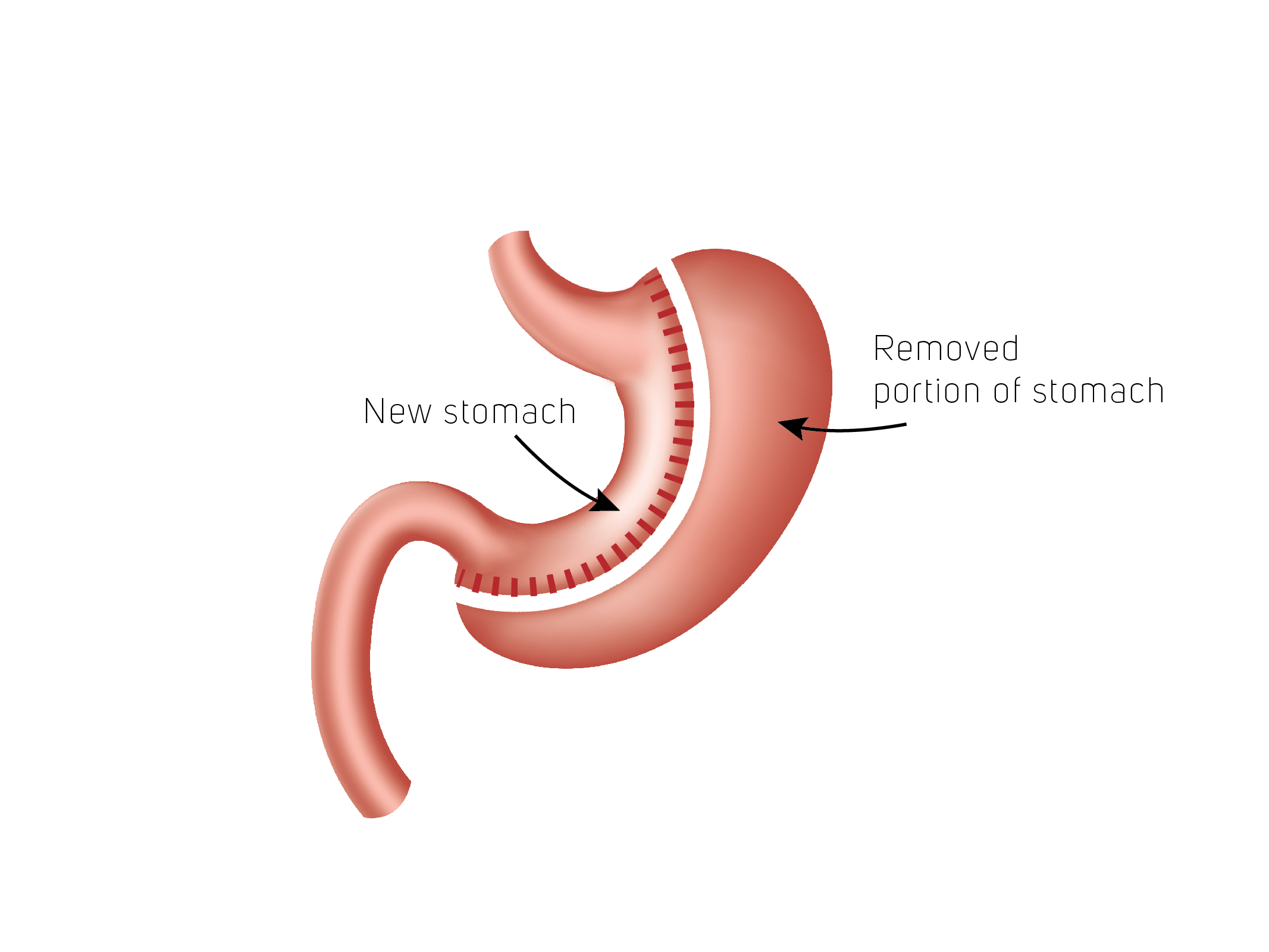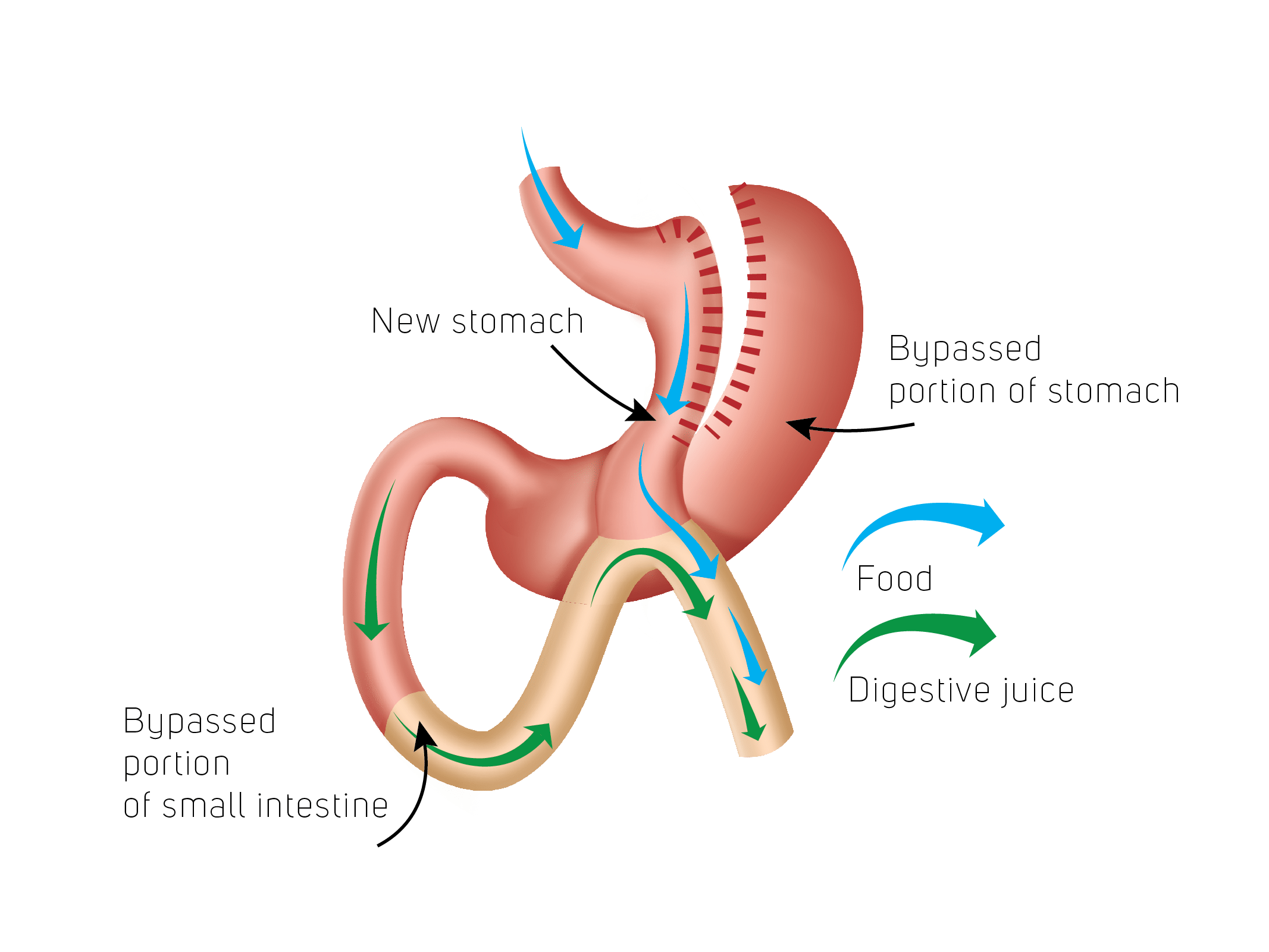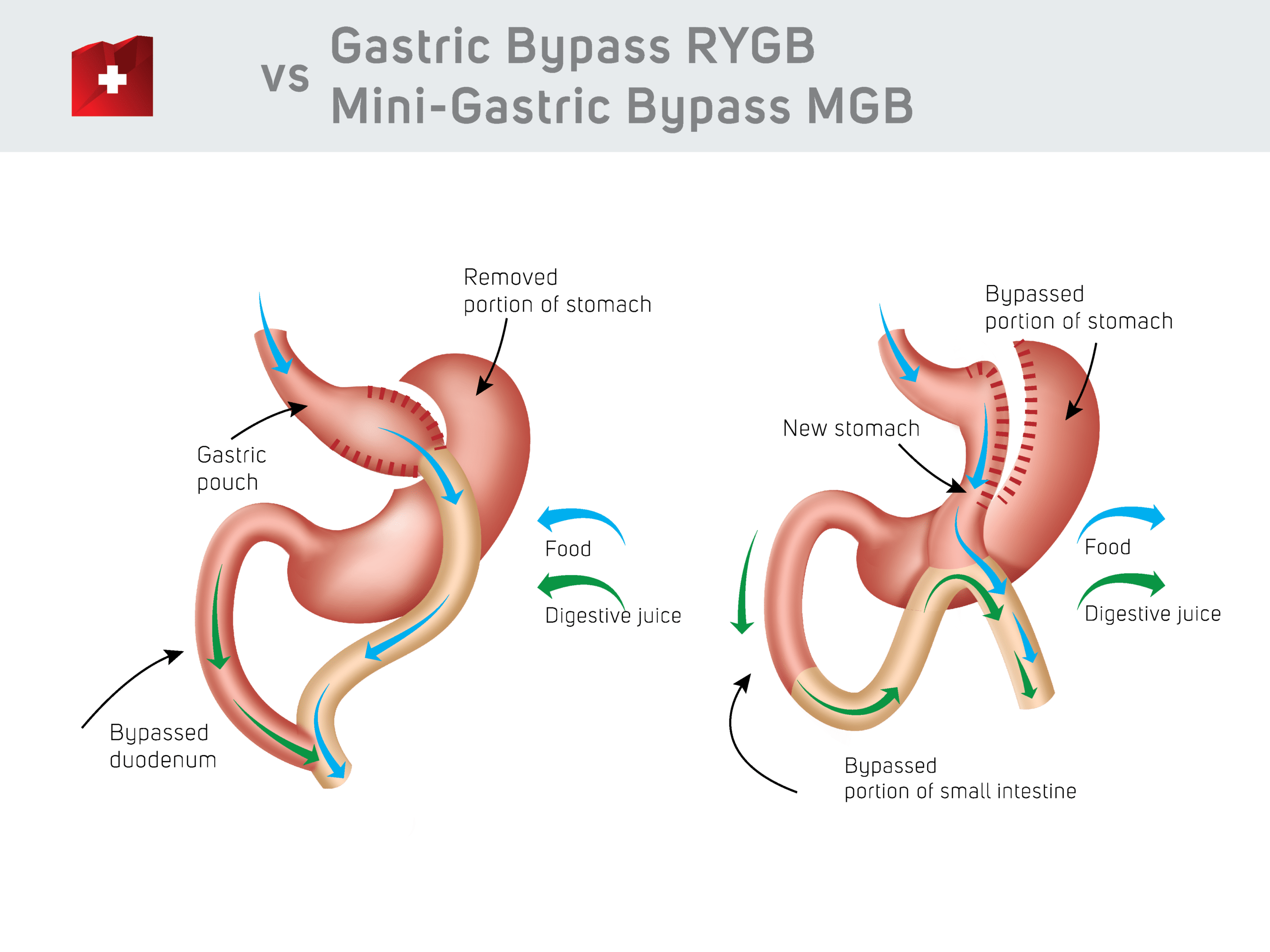Contact the coordinator
+48 75 645 2011
WhatsApp
+48 535 098 999

Contact the coordinator
+48 75 645 2011
WhatsApp
+48 535 098 999
Leave us a message
weightloss@kcmclinic.com
Obesity is a growing health concern and may result in severe complications, including diabetes and heart disease. While many people are able to tackle obesity with the help of medications and dietary and lifestyle changes, some people may require weight loss surgeries. One such popular surgery is a mini gastric bypass or one-anastomosis (mini) gastric bypass (OAGB).
At KCM Clinic, we specialise in laparoscopic mini gastric bypass surgery, employing the latest techniques and state-of-the-art facilities to ensure optimal results. Our patient-centric approach means that we prioritise your comfort, safety, and individual needs throughout the entire process.
Mini gastric bypass surgery, also known as laparoscopic mini gastric bypass or one-anastomosis (mini) gastric bypass (OAGB), is an advanced and minimally invasive procedure designed to facilitate weight loss and enhance overall well-being.
This innovative surgical intervention combines elements of both the gastric sleeve and the Roux-en-Y gastric bypass and focuses on reducing the size of the stomach while redirecting the digestive system. It hence offers a combination of food restriction and controlled malabsorption to promote effective weight loss.
Performed laparoscopically, mini gastric bypass surgery offers several advantages over traditional open surgery. With smaller incisions and advanced surgical tools, the procedure minimises scarring, discomfort, and recovery time. By opting for this minimally invasive approach, you can expect a quicker return to your daily activities and reduced risk of complications.


£ 15.000 starting price
Mini Gastric Bypass in the UK

£ 5.490 (All Inclusive)
Mini Gastric Bypass In Europe with KCM Clinic
Mini gastric bypass surgery is generally performed using a laparoscopic technique under general anaesthesia. The procedure begins with the creation of small incisions, through which specialised laparoscopic instruments are inserted.
Using these instruments, the surgeon staples the top portion of the stomach, forming a thin tube with a capacity of approximately 30ml to 50ml. This newly formed tube becomes the new, smaller stomach, completely separate from the rest of the stomach. The surgeon then connects this new stomach to a loop of the small intestine, bypassing the duodenum and approximately 150-200cm of the bowel.
The remaining portion of the stomach and upper part of the small intestine, although still functional, then stops being involved in the digestion process. As a result, this technique helps to not only reduce the amount of food you can eat but also restrict the amount of calories you can absorb from your food.
Laparoscopic mini gastric bypass in the UK has a proven track record of facilitating significant weight loss for many patients. While individual results may vary, this procedure has consistently delivered remarkable outcomes. However, to achieve substantial weight loss, it is crucial to follow the recommended dietary and lifestyle changes after the mini gastric bypass procedure.
Typically, patients lose an average of 60-70% of their excess body weight within the first year after mini gastric bypass surgery. Moreover, sustained weight loss can be maintained in the long term. As you shed excess weight, you may also notice improvements in obesity-related health conditions such as type 2 diabetes, high blood pressure, and sleep apnea. Enhanced mobility, increased energy levels, and an overall improvement in well-being are among the many positive changes that can accompany significant weight loss.
At KCM Clinic, our priority is to provide patients with the highest-class medical care based on their individual needs and expectations. For over 10 years of working with overweight patients, we have developed, as a multidisciplinary team, an optimal package, containing a number of tests and consultations necessary to perform the procedure.
The Total Cost Estimate of the package includes:
My research for where to have bariatric surgery led me to KCM clinic in Poland and I am forever grateful. Everyone was professional and made me feel great. Karolina was so excellent coordinating everything from start, Dr. Grzegorz Kowalski put my mind at ease and did an awesome job.
My procedure was surprisingly extra smooth... Read more
My experience of KCM has been great right from the beginning talking to Kim (My patient co-ordinator) through to surgery day and beyond.
I flew in on a Thursday and had extensive pre op tests Thursday and Friday, then had gastric sleeve surgery on the Saturday and flew home Monday. The whole process ran smoothly and...Read more
Mini gastric bypass is a surgery that combines some elements of the gastric sleeve and Roux-en-Y gastric bypass procedures. During the operation, the upper part of the stomach is formed into a sleeve-shaped tube and then connected to the loop of the small intestine. Mini gastric bypass causes speedy and permanent weight loss by preventing You from eating too much and reducing the absorption of calories from food, especially from fatty meals.
Mini gastric bypass procedure is performed using the minimally invasive laparoscopic method (keyhole surgery). Thanks to this, You avoid having a large scar on the abdomen. Laparoscopic operations are distinguished by a fast recovery rate and a low chance of unwanted events. During the mini gastric bypass procedure, You remain under general anesthesia, so You do not feel any pain, nor do You remember the course of the surgery after waking up.
Patients preparing for bariatric surgery in recent weeks should be on a liquid diet that will relieve the relief of the stomach and liver. This results in more effective weight loss after the procedure, less likely for complications during the procedure. Multivitamin preparations and other supplements are important, which are prescribed depending on the results of the tests and the doctor’s recommendations after the qualifying visit. The patient should appear at the hospital in the morning of supper with a complete set of examinations, pyjamas, variable footwear.
Comprehensive tests and consultations are required to qualify and prepare for bariatric surgery for patient safety. All consultations and tests can be done at KCM Clinic.
Before surgery, it is very important to follow a specially prepared, pre-operative diet for a week before surgery. This diet is designed to help reduce the volume of the liver and stomach to facilitate surgery and convalescence. The diet should only be used before surgery and should not be continued later.
Why should you follow a diet?
The diet contains low carbohydrates and fats. Therefore, it will reduce glycogen stores (glycogen is a type of sugar stored in the liver and muscles for energy). Please do not be tempted to eat a special or large meal before surgery, because this completely reduces the effect of the diet.
Food guidelines before surgery abroad:
Removing part of the stomach and performing a mini gastric bypass requires a change in eating habits because the proper functioning of the digestive tract is disturbed. The diet after the OAGB procedure requires the introduction of a liquid or semi-liquid nutrition, in meals with small volumes, divided into 5-6 daily for 6 weeks after the procedure. These can be fruit and vegetable purées, puddings, jellies, jelly, yoghurt without fruit particles, cream soups. After some time, it is necessary to enrich the food with protein and other necessary ingredients. The menu for several weeks after the OAGB procedure should contain easily digestible products. You must eliminate food that is in the stomach for a long time and is hard to digest.
Laparoscopy allows the patient to return to a normal lifestyle much faster. Usually, a week after surgery, the patient returns to work except for hard physical work, without pain.
The most important change in life after surgery is the diet and the amount of food that the patient consumes. It will also help prevent postoperative complications.
A very strict diet after surgery may seem exaggerated. But remember, not following this diet can cause complications such as diarrhoea, dehydration, constipation, intestinal obstruction or very severe gastric acid leakage.
Here are some basic rules:
Laparoscopic surgery makes it possible for patients to recover faster. The patient will be able to drink and get up from the bed, a few hours after the procedure, as well as move independently. For safety, a hospital stay of several days is necessary.
Mini gastric bypass is a surgery that combines some elements of the gastric sleeve and Roux-en-Y gastric bypass procedures. During the operation, the upper part of the stomach is formed into a sleeve-shaped tube and then connected to the loop of the small intestine. Mini gastric bypass causes speedy and permanent weight loss by preventing You from eating too much and reducing the absorption of calories from food, especially from fatty meals.
Mini gastric bypass procedure is performed using the minimally invasive laparoscopic method (keyhole surgery). Thanks to this, You avoid having a large scar on the abdomen. Laparoscopic operations are distinguished by a fast recovery rate and a low chance of unwanted events. During the mini gastric bypass procedure, You remain under general anesthesia, so You do not feel any pain, nor do You remember the course of the surgery after waking up.
Patients preparing for bariatric surgery in recent weeks should be on a liquid diet that will relieve the relief of the stomach and liver. This results in more effective weight loss after the procedure, less likely for complications during the procedure. Multivitamin preparations and other supplements are important, which are prescribed depending on the results of the tests and the doctor’s recommendations after the qualifying visit. The patient should appear at the hospital in the morning of supper with a complete set of examinations, pyjamas, variable footwear.
Comprehensive tests and consultations are required to qualify and prepare for bariatric surgery for patient safety. All consultations and tests can be done at KCM Clinic.
Before surgery, it is very important to follow a specially prepared, pre-operative diet for a week before surgery. This diet is designed to help reduce the volume of the liver and stomach to facilitate surgery and convalescence. The diet should only be used before surgery and should not be continued later.
Why should you follow a diet?
The diet contains low carbohydrates and fats. Therefore, it will reduce glycogen stores (glycogen is a type of sugar stored in the liver and muscles for energy). Please do not be tempted to eat a special or large meal before surgery, because this completely reduces the effect of the diet.
Food guidelines before surgery abroad:
Removing part of the stomach and performing a mini gastric bypass requires a change in eating habits because the proper functioning of the digestive tract is disturbed. The diet after the OAGB procedure requires the introduction of a liquid or semi-liquid nutrition, in meals with small volumes, divided into 5-6 daily for 6 weeks after the procedure. These can be fruit and vegetable purées, puddings, jellies, jelly, yoghurt without fruit particles, cream soups. After some time, it is necessary to enrich the food with protein and other necessary ingredients. The menu for several weeks after the OAGB procedure should contain easily digestible products. You must eliminate food that is in the stomach for a long time and is hard to digest.
Laparoscopy allows the patient to return to a normal lifestyle much faster. Usually, a week after surgery, the patient returns to work except for hard physical work, without pain.
The most important change in life after surgery is the diet and the amount of food that the patient consumes. It will also help prevent postoperative complications.
A very strict diet after surgery may seem exaggerated. But remember, not following this diet can cause complications such as diarrhoea, dehydration, constipation, intestinal obstruction or very severe gastric acid leakage.
Here are some basic rules:
Laparoscopic surgery makes it possible for patients to recover faster. The patient will be able to drink and get up from the bed, a few hours after the procedure, as well as move independently. For safety, a hospital stay of several days is necessary.




Contact the coordinator
+48 75 645 2011
WhatsApp
+48 535 098 999
Leave us a message
weightloss@kcmclinic.com
NON-INVASIVE TREATMENT OF OBESITY
Send Request
Register
Visits, hospital procedures
Bariatric Surgery Center
Plastic Surgery Center
Spine Surgery Center
Dental Clinic
OMEGA Imaging Diagnostic Center
Work hours
KCM Clinic Wrocław
Chat KCM Clinic
Locations
KCM Clinic Jelenia Góra
KCM Clinic Wrocław
Parking